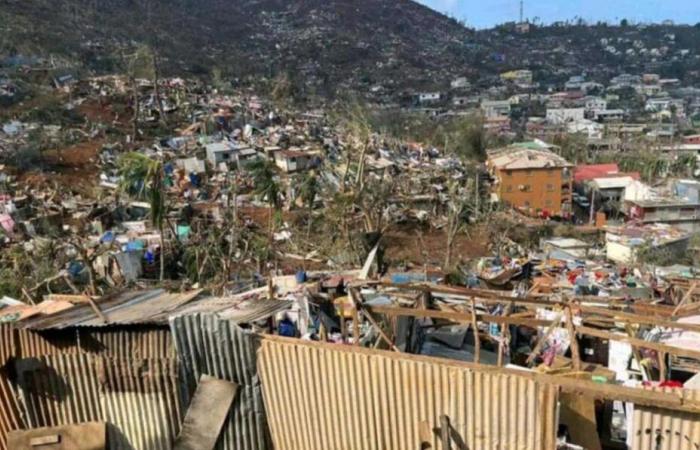Last spring, the island experienced a cholera epidemic, the last case of which was recorded in mid-July. But the damage caused by the cyclone requires increased vigilance.
A bloodless health system, access to drinking water made even more difficult and a degraded wastewater network… It is known: among the batches of misfortunes that natural disasters bring, there is the diffusion ease of microbes. While the human toll is still not known at this stage, the risk of diseases developing in Mayotte after the devastation of Cyclone Chido is taken seriously. Indeed, the island has just emerged from a cholera epidemic which, between March and July, affected more than 200 people and led to the death of at least five people. What is the risk that such an epidemic will start again? Answers with two specialists.
« Obviously, the last known case dates from July, the bacteria (at the origin of cholera, Editor’s note) no longer seems to have been circulating on the island since then »reports Professor François-Xavier Weill, doctor and director of the National Reference Center for Cholera at the Pasteur Institute. « If the disease is not imported again, there will be no epidemic. One theory proposed that the bacteria could persist for a very long time in the environment, but all recent data supports the role of humans in the transmission of cholera. »he explains. In other words, the environment only plays a role during the epidemic phase, when it is contaminated by the droppings of patients.
If the disease is not imported again, there will be no epidemic.
Professor François-Xavier Weill, doctor and director of the National Reference Center for Cholera at the Pasteur Institute
Last March, the incriminated bacteria arrived in Mayotte by nationals of another island in the Comoros, which itself had been affected by people from Tanzania at the end of January 2024. This country and 11 other African countries The East has been facing a serious cholera epidemic for more than a year (more than 240,000 cases and 4,000 deaths since the start of 2023).
Also read
Cyclone Chido: in Mayotte, “it feels like after the Second World War”
« To my knowledge, there are no more cases of cholera on Anjouan, the island of the Comoros Archipelago closest to Mayotte and from which people arrive by boat. On the other hand, there would be some on Mohéli, an island a little further away »indicates for his part Professor Renaud Piarroux, head of department at the Pitié-Salpêtrière hospital, specialist in epidemics. According to him, the risk of cholera in Mayotte is therefore limited for the moment, but vigilance remains essential. « There is no cholera epidemic if there are no patients, it does not start from nothing »he insists.
A strain resistant to antibiotics
According to Professor Weill, the « only risk » would be that « the disease is imported again and the health system does not quickly identify the first cases ». Each patient excretes millions of bacteria into the wastewater, which can quickly become an oil stain. In fact, the disease is transmitted by ingestion of water or food contaminated by the stools of sick individuals. Not knowing how to detect the first patients very quickly can quickly send the situation out of control. But this scenario seems unlikely at this stage. « On the one hand because the health authorities succeeded in effectively controlling the epidemic last spring and on the other hand because the laboratory of the Mayotte hospital center, which analyzes the samples, is of high quality and was relatively spared by the cyclone, according to my colleagues who are on site »explains the scientist.
With his team from the Pasteur Institute, Professor Weill discovered that the strain of cholera circulating in Mayotte last spring was highly resistant to two of the three classes of antibiotics usually used against cholera. « This strain emerged in Yemen in 2018, before reaching Lebanon in 2022. It now spreads throughout East Africa »indicates the doctor. If this new characteristic does not pose a problem immediately, it raises fears of difficulties in the future. « Treatment of patients is mainly based on rehydration. Antibiotics above all shorten the duration of symptoms and therefore contagiousness. Without the use of effective antibiotics, there is a greater risk of spread of the disease.specifies Professor Weill.
Conditions conducive to the spread of diseases
Beyond the risk of cholera, the cyclone creates conditions conducive to the development of other diseases. « Given the situation, access to water will be even more degraded and the population will drink the water they can find. If it is in the presence of water contaminated by pathogens, there is a risk of typhoid fever or an epidemic of diarrhea due to bacteria such as E. coliknown to provoke tourists »explains Professor Renaud Piarroux. Before the cyclone hit, Mayotte was already suffering from serious problems with access to drinking water, with almost a third of families not having running water, according to data from INSEE.
On Monday, the resigning Minister of Health, Geneviève Darrieussecq, declared that it was necessary to put in place a « strong health monitoring » to detect possible « emerging contagious diseases from the consumption of polluted water or spoiled food »even if an epidemic is not today « not on the agenda ».






